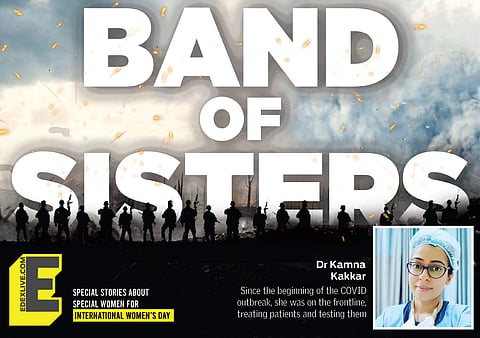

In the last year of her medical residency, Dr Kamna Kakkar saw a lot many things that she never thought she would. The world almost came crumbling down in front of her with the onset of a pandemic in the wee months of 2020. She had read and heard about patients being abandoned by their families in the past, but this time, it was all happening in front of her. A lot of them contracted an alien but heavily stigmatised virus, dropped dead, alone, with no one to care for them, except a group of doctors like her and other frontline workers. In fact, the doctor recalls cases where the hospital staff had to bury patients who died of COVID because nobody came forward to claim their bodies.
Kamna is now a Senior Resident at Pandit Bhagwat Dayal Sharma Post Graduate Institute of Medical Sciences, Haryana. Most people would know this 28-year-old as among the first few to bring up the issue of the lack of PPE kits in hospitals. She was also among the first to point out the difficulties of women frontline workers who wear PPE kits while menstruating. However, these are chapters of her life that Kamna wishes to forget, she says. Her tweet that spoke about the lack of PPE kits in hospitals had gone viral and she was subjected to a lot of trolling and name-calling.
When Kamna says, "You cannot take your health for granted," one must understand that this is not some regular medical advice that they have been used to throughout their life. This comes from the experience of fighting one of the most dreadful pandemics of our times. "I've seen patients whose extended families ran away the minute they were diagnosed. For most, only their spouses or parents stood by them. There was a lot of stigma around the virus. The stigma was so strong that people refused to take care of their own kin. This affected me a lot," says Kamna, adding, "Every second person out there was battling it alone. It is so sad to die alone, it shouldn't happen to anyone."
Since the beginning of 2020, Kamna had been hearing about the Coronavirus and how quickly it affected the people of China, Italy and the US. "However, India did not have many cases then, even though we were treating cases of sore throat and fever. A lot of these patients required intubation too. It was only in March that we ramped up testing. There was hardly any awareness before that," she says. She remembers how there was no demarcation between COVID and non-COVID patients at that time. "There were cases where patients would lie about their symptoms and travel history. Quarantine norms were flouted. Many times, asymptomatic patients tested positive," she recalls.
Then one day in March, unexpectedly, everyone was in the comfort of their homes. The case was not the same for Kamna and her family — her mother is a bank employee, her sister is a doctor and her brother is a physiotherapist. "Ours is a family of frontliners who made sure that we didn't infect each other. If you think my case was bad, my sister, who is an anesthesiologist at AIIMS, Rishikesh, was not able to meet her child for nine months. That was depressing," she says.
Kamna was on the other side of the ordeal too when she herself got infected by the virus in September. "I was quite weak and my parents brought me home. I was scared when my fever didn't subside even after eight days. My family stood by me, my brother put wet towels on my head to break the fever," she recalls. The fight against the virus is not over and Kamna is still there on the frontline, strong. But this year, she is probably a tad stronger than she has been in the past — circumstance made it so. 2020 was definitely a year with a lot of learning.
